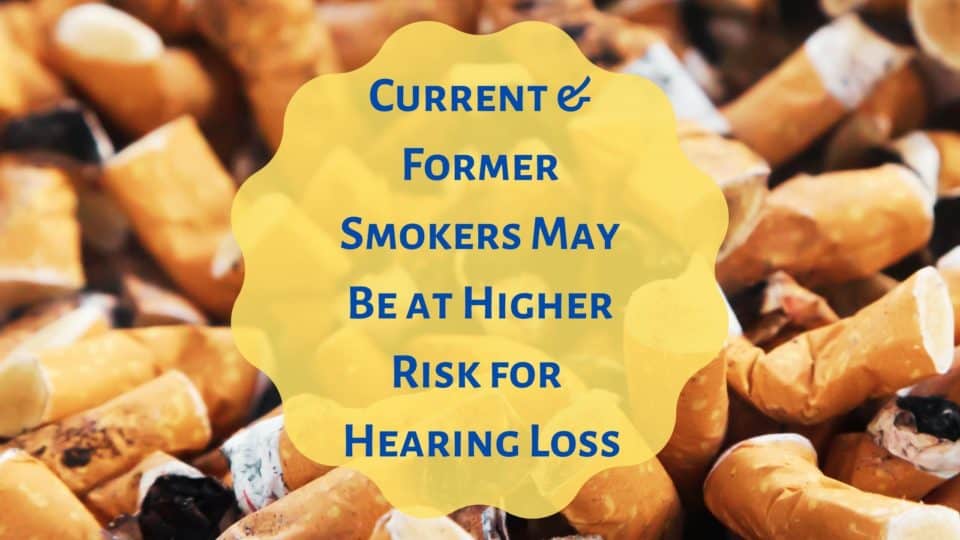- A Closer Look at Common Myths About Hearing Loss - May 7, 2024
- The Impact of Pets on Emotional and Hearing Health - April 26, 2024
- Strategies for Coping with Single-Sided Deafness - April 16, 2024
If you are a smoker, you are probably familiar with at least a few reasons to quit. Aside from it being an addictive habit which puts your body at risk for lung cancer and hypertension and heart disease, now there is research emerging that smoking can increase the risk of hearing loss. Research finds that smoking not only increases the likelihood of sensorineural hearing loss, but the more you smoke, the higher the risk.
A Recent Study on Smoking
A 2018 study from Japan collected data from over 50,000 people aged 20 to 64. They surveyed participants on their daily tobacco use and measured their hearing at the beginning and the end of the study, several years later. The results of the study showed that those who smoked up to 10 cigarettes daily were at a 40% increased risk of developing hearing loss in comparison to non-smokers. Participants who smoked 11 to 20 cigarettes per day were 60% more likely to have hearing loss. Perhaps the most shocking was the finding that those in the study who smoked more than 20 cigarettes per day were 70% more likely to develop hearing loss!
2020 Study on Smoking
A 2020 study titled “Cigarette Smoking, Smoking Cessation, and Risk of Hearing Loss in Women” was Published in the American Journal of Medicine. The study examined over five thousand participants who experienced hearing loss during the study. The study analyzed the results and found that smokers had a 60% greater chance of experiencing high-frequency hearing loss than nonsmokers. While current smokers were found to have the highest risk of hearing loss, the study found that past smokers had a slightly higher risk than those who had never smoked at all. The good news is that even if you have smoked in the past there is hope for your hearing. The study found that those who had stopped smoking for over ten years did not have an increased risk of hearing loss. This is one more very good reason to quit!
Why is smoking bad for our hearing?
We know that smoking can damage our lungs and comprises our heart health, but how exactly does smoking tobacco actually damage our hearing? The main causes has to do with how smoking tobacco affects the movement of blood in our body:
Decreased Circulation of Blood
Nicotine causes your blood vessels to constrict or narrow, which limits the amount of healthy oxygenated blood that flows to your organs. This includes your auditory system which you use to hear. When the structures of your auditory system don’t receive enough oxygen in the blood they need to properly function, your hearing suffers. This includes the tiny cells of the inner ear, which send sound from the ear to the brain to be processed. When these cells become damaged or destroyed, they cannot regrow or be repaired, leaving an individual with permanent hearing loss.
Nicotine and speech comprehension
In addition to constricting blood vessels, nicotine and carbon monoxide from smoking cigarettes, when released into the blood, can damage nerves in the brain. Neurotransmitters send an auditory message from the brain to the ear, and can be affected by nicotine use. When neurotransmitters become disrupted, it can lead to challenges in differentiating between sounds and tones. This can make conversations sound muffled, especially in noisy settings when the brain has to prioritize certain sounds over others. This makes following conversation amongst noise more challenging.
Increased blood pressure
The nicotine in cigarette smoke raises blood pressure as well as your heart rate. Over time it narrows your arteries making it more likely that you will suffer a blood clot, stroke or heart attack. High blood pressure can also impair the blood vessels in your inner ear, causing permanent damage. High blood pressure over an extended amount of time can damage hearing, along with a whole host of other serious health complications. The good news is that once you quit smoking it only takes a short time for your blood pressure to return to a normal rate.
Letting go of self-sabotaging habits
If you want to be able to hear the people in your life, and the sounds you love, the best time to quit smoking is now! However, if you suspect that you do have hearing loss, even when it is permanent, there is hope. Schedule a hearing test today and find out how we can help you hear as clearly as possible, today!

